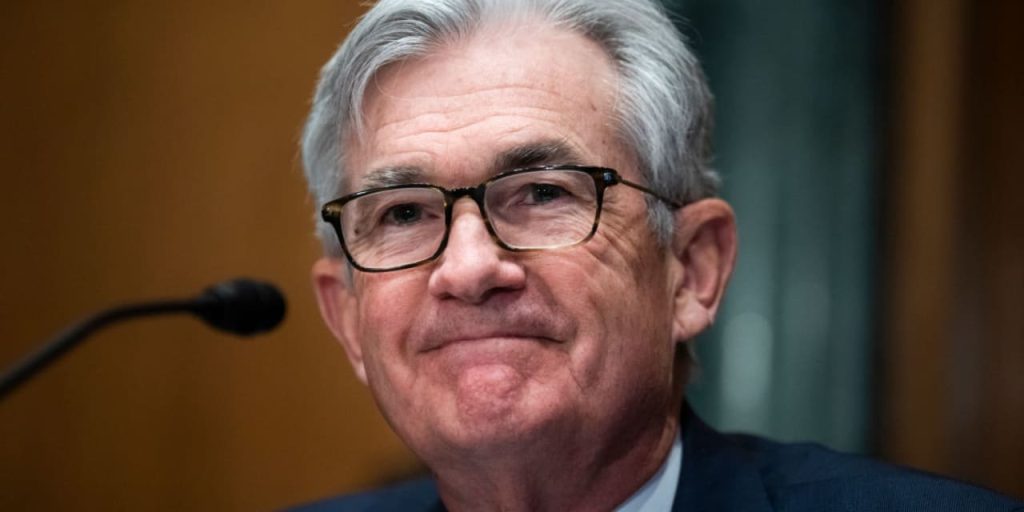The Federal Reserve’s main message to investors and markets next week is likely to be borrowed from the British government’s World War II instruction to “Keep Calm and Carry On.”
Calm in financial markets has been a scarce commodity recently. Recent market moves have been aggressive with 10-year Treasury yields
BX:TMUBMUSD10Y
behaving more like stock prices, rising close to 5% in mid-October and then falling sharply to 4.24%.
And as the Fed prepares to review policy again this week, Wall Street economists are busy debating which month a recession will start next year. Traders in derivative markets think the Fed will get aggressive and cut its benchmark interest rate by more than 100 basis points. Fears about inflation and the Federal government’s ability to fund its large fiscal deficit seem to have vanished.
Will the Fed “push back” on these market expectations?
Only a little bit, said Stephen Gallagher, U.S. chief economist at Societe Generale.
“I just don’t see the Fed pushing back super-hard. It will be a mild pushback,” he said.
It is widely assumed that the Fed will hold its benchmark interest rate steady at 5.25%-5.% after its meeting ends Wednesday. That’s the third straight meeting holding steady. The last rate rise was in July.
The Fed will put out a statement and its new economic forecast at 2 p.m. Eastern, followed by a Powell press conference at 2:30 p.m.
There will be a package of small decisions that add up to a message of only small changes, with the Fed being more of an “ocean liner” rather than a “speed boat,” in an analogy used Friday by former Boston Fed President Eric Rosengren.
- First, the Fed’s policy statement will continue to lean hawkish by talking again about possible future tightening.
- The Fed’s new “dot-plot” will only show 50 basis points of cuts in 2024, the same forecast as September.
- The new forecast will continue to forecast slower economic growth in 2024 but no recession.
- At his press conference, Fed Chair Powell will remind the market that the Fed might have to hike interest rates again if inflation reaccelerates.
- And Powell will stress that it is “premature” to talk about rate cuts.
Tom Porcelli, chief U.S. economist at asset-manger PGIM Inc. thinks Fed officials might pencil in three rate cuts in 2024 and, as a result, Powell would seek to counter that dovishness by sounding a little more hawkish at his press briefing.
“Fed officials will be loath to add any more fuel to the rate cut conversation to next year, which is pretty much in full swing at this point,” Porcelli said.
The Fed is worried that sounding too dovish, because, at least in theory, it could cause financial conditions to ease and inflation to reaccelerate, Porcelli said.
Traders in derivative markets see a big chance the first Fed rate cut will come in March.
Gallagher said it would take “jarring news” for the Fed to cut rates so quickly.
Agron Nicaj, U.S. economist at MUFG Bank, said recent data showing slower economic growth and subdued inflation gives Powell justification to be a little more dovish around the edges,
For instance, Powell is likely to say again that Fed has pushed up interest rates “well into restrictive territory,” a hint that rates might not have to stay so high for so long, Nicaj said.
One reason Powell won’t try to sound more hawkish is that it would be hard to do, said Gennadiy Goldberg, head of U.S. rates strategy at TD Securities.
Powell will have to note that the economy is slowing and the Fed’s “dot-plot” will also show no more rate hikes.
“How do you sound hawkish in all of that?” Goldberg said.
Goldberg said he expects a similar outcome to the November press conference, where the longer Powell spoke, the more dovish he sounded.
Read: Powell adds fuel to the talk that the Fed is done hiking rates
“The longer Powell speaks the more difficult it will be for him to come up with a good answer as to why the Fed is not easing policy yet,” Goldberg said.
“I do think the tone is one of data dependence and talking about ‘higher for longer.’ He’ll try. But I don’t know that the market will listen,” he added.
Read the full article here
